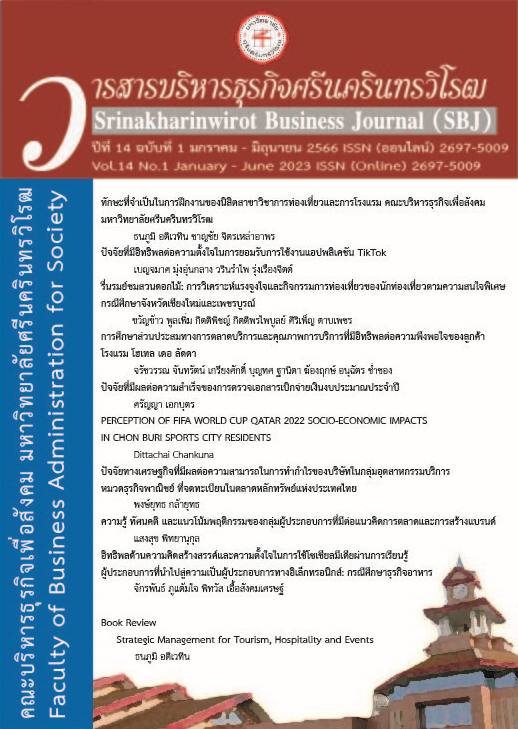THE INFLUENCE OF CREATIVITY AND INTENTION TO USE OF SOCIAL MEDIA ON ELECTRONIC ENTREPRENEURSHIP THROUGH ENTREPRENEURIAL LEARNING: A CASE STUDY OF FOOD BUSINESS
อิทธิพลด้านความคิดสร้างสรรค์และความตั้งใจในการใช้โซเชียลมีเดีย ผ่านการเรียนรู้ผู้ประกอบการที่นำไปสู่ความเป็นผู้ประกอบการ ทางอิเล็กทรอนิกส์: กรณีศึกษาธุรกิจอาหาร
Keywords:
Creativity, Social media intention, E-entrepreneurship, Entrepreneurial learningAbstract
This research aims to study the influence of creativity and the intention to use social media through entrepreneurial learning, leading to becoming an E-entrepreneur. The research population includes individuals in the food business or representatives of food businesses, such as owners, managers, and staff.The researcher collected data through a questionnaire from a specific sample of 400 participants using a specific random sampling method. The statistical techniques used in the study include frequency, percentage, mean, standard deviation, Pearson's correlation coefficient, and hypothesis testing using structural equation modeling (SEM). The research findings indicate that both creativity and the intention to use social media contribute to promoting E-entrepreneur through entrepreneurial learning. The results of this study have implications for those interested in studying or involved in the food business, such as associations or food business operators. It can support the development of entrepreneurial potential in becoming electronic business entrepreneurs by utilizing social media as a tool to access learning resources for entrepreneurs, as well as fostering creativity to drive entrepreneurial learning, improve business operations, enhance electronic business entrepreneurial capabilities, and enable businesses to compete in the market and achieve future success.Downloads
References
กรมพัฒนาธุรกิจการค้า. (2565). บทวิเคราะห์ ประจำเดือนกันยายน 2565 ธุรกิจร้านอาหาร. ค้นเมื่อ
พฤษภาคม 2565 จาก https://www.dbd.go.th/download/article/article_20221025094101.pdf
กัลยา วาณิชย์บัญชา. (2554). การใช้ SPSS for Windows ในการวิเคราะห์ข้อมูล (พิมพ์ครั้งที่ 18). ธรรมสาร.
บุญชม ศรีสะอาด. (2560). การวิจัยเบื้องต้น (พิมพ์ครั้งที่7). กรุงเทพฯ: สุวีริยาสาส์น.
วรัทยา ธรรมกิตติภพ และกรปภา เจริญชันษา. (2562). คุณลักษณะของผู้ประกอบการสร้างสรรค์ และกิจกรรมเตรียมความพร้อมสู่การเป็นผู้ประกอบการสร้างสรรค์ ภายใต้แนวคิดเศรษฐกิจสร้างสรรค์. วารสารการศึกษาและการพัฒนาสังคม, 14(2), 109-123. ค้นเมื่อ 12 พฤษภาคม 2565 https://ojs.lib.buu.ac.th/index.php/social/article/view/6323/3498
ศูนย์วิจัยกสิกรไทย. (2563). ธุรกิจร้านอาหารเผชิญกับโจทย์ท้าทายสูง และรูปแบบการแข่งขันที่เปลี่ยนไป
คาดมีมูลค่า 4.37 – 4.41 แสนล้านบาท (กระแสทรรศน์ ฉบับที่ 3067). ค้นเมื่อ 10 พฤษภาคม 2565
จาก https://www.kasikornresearch.com/th/analysis/k-econ/business/Pages/z3067.aspx
สำนักงานเลขานุการของคณะกรรมการยุทธศาสตร์ชาติ. (2564). ยุทธศาสตร์ชาติ พ.ศ. 2561-2580. สำนักงานคณะกรรมการพัฒนาการเศรษฐกิจและสังคมแห่งชาติ. ค้นเมื่อ 28 เมษายน 2565 http://nscr.nesdc.go.th/wp-content/uploads/2021/06/May21_Full_01.pdf
Abdelfattah, F., Al Halbusi, H., & Al-Brwani, R. M. (2022). Influence of self-perceived creativity and social media use in predicting e-entrepreneurial intention. International Journal of Innovation Studies, 6(3), 119-127. https://www.sciencedirect.com/science/article/pii/S2096248722000145
Anderson, N. H. (1974). Cognitive algebra: Integration theory applied to social attribution. In Advances in Experimental Social Psychology, 7(1), 1-101. https://www.sciencedirect.com/science /article/abs/pii/S0065260108600350
Arif, M., Qaisar, N., & Kanwal, S. (2022). Factors affecting students' knowledge sharing over social media and individual creativity: An empirical investigation in Pakistan. The International Journal of Management Education, 20(1), 1-12. https://www.sciencedirect.com/science/article/abs/pii/S14728 11721001476
Asadollahi Kheirabadi, M., & Rafieian, J. (2019). A review of e-entrepreneurship in the net economy and its economic impacts. Journal of Humanities Insights, 3(04), 215-219. https://scholar.google.com/citationsview_op=view_citation&hl=th&user=APqpHKcAAAAJ&citation_for_view=APqpHKcAAAAJ:9yKSN-GCB0IC
Byrne, B. M. (2010). Structural equation modeling with AMOs: Basic concepts, applications, and programming. 2nd ed. Routlege Taylor and Francis Group.
Cochran, W. G. (1977). Sampling techniques (3rd ed.). John Wilay & Sons.
Fornell, C. D., & Lacker, D. F. (1981). Evaluating structural equation models with unobservable variables and measurement error. Journal of Marketing Research, 18, 39-50. https://journals.sagepub.com/doi/abs/10.1177/002224378101800104
Hair J. F., W. C. Black., B. J. Babin, and R. E. Anderson. (2010). Multivariate Data Analysis (7th ed). United Kingdom: Pearson Education.
Hinkle, D.E., William, W. & Stephen G. J. (1998). Applied Statistics for The Behavior Sciences (4th ed). Houghton Mifflin.
Hon, J. G. (2018). Entrepreneurial learning strategy. Government of South Australia.
Ince, H., Imamoglu, S. Z., & Turkcan, H. (2021). Relationships among absorptive capacity, creativity and job performance: the moderating role of social media usage. Management Decision, 1(1), 858-882. https://www.emerald.com/insight/content/doi/10.1108/MD-09-2020-1186/full/html
Islam, M. A., & Alghobiri, M. A. (2018). E-entrepreneurship for e-startups: Potentials, common challenges and way forward. Information Management and Business Review, 10(4), 44-50. https://papers.ssrn.com/sol3/papers.cfm?abstract_id=3319753
Khosla, A., & Gupta, P. (2017). Traits of Successful Entrepreneurs. The Journal of Private Equity, 1(1). 12-15. https://www.jstor.org/stable/44397516
Kline, R. B. (2010). Principles and practice of structural equation modeling. The Guilford Press.
Kumar, M., & Shukla, P. (2019). Creativity, proactive personality, and entrepreneurial intentions:
Examining the mediating role of entrepreneurial self-efficacy. Global Business Review, 23(1),
-118. https://journals.sagepub.com/doi/full/10.1177/0972150919844395
Lai, L. S., & To, W. M. (2020). E-Entrepreneurial intention among young chinese adults. Asian Journal of Technology Innovation, 28(1), 119-137. https://doi.org/10.1080/19761597.2020.1713832
Markowska, M. (2011). Entrepreneurial competence development: Triggers, processes & consequences. Jönköping University.
Roslan, M. H. H., Hamid, S., Ijab, M. T., & Bukhari, S. (2019, December). Social entrepreneurship learning model in higher education using social network analysis. Journal of Physics: Conference Series, 1339(1). 1-12. 10.1088/1742-6596/1339/1/012029
Rubik, A. (2022). The role of social media in creativity management in advertising agencies. International Journal of E-Services and Mobile Applications (IJESMA), 14(1), 1-18. https://www.igiglobal.com/article/the-role-of-social-media-in-creativity-management-in-advertising-agencies/296583.
Rungsrisawat, S., & Sutduean, C. (2019). Entrepreneurial education and entrepreneurial intention:
The mediating role of creativity disposition among university students in thailand.
International Journal of Innovation, Creativity, and Change, 6(10), 213-232. https://www.ijicc.net/images/vol6iss10/61015_Rungsrisawat_2019_E_R.pdf
Setiadi, N. J., Sutanto, H., & Ashary, R. R. (2021). Observing the role of social media to accelerate creativity development. In 2021 International Conference on Information Management and Technology (ICIMTech), 1(1), 388-392. 10.1109/ICIMTech53080.2021.9535071
Shimoli, S. M., Cai, W., Abbas Naqvi, M. H., & Lang, Q. (2020). Entrepreneurship success traits.
Do kenyans possess the desired entrepreneur personality traits for enhanced e-entrepreneurship? Case study of Kenyan students in the people’s republic of China. Cogent Business & Management, 7(1), 1-19. https://doi.org/10.1080/23311975.2020.1847863
Spanjer, A., & Witteloostuijn, A. van (2017). The entrepreneur’s experiential diversity and entrepreneurial performance. Small Business Economics, 49, 141-161. DOI 10.1007/s11187-016-9811-0
Vera, D., & Crossan, M. (2004). Strategic leadership and organizational learning. Academy Of Management Review, 29(2), 222-240. 10.5465/AMR.2004.12736080
Yamakawa, Y., & Cardon, M. S. (2015). Causal ascriptions and perceived learning from entrepreneurial failure. Small Business Economics, 44, 797-820. https://link.springer.com/article/10.1007/s11187-014-9623-z
Downloads
Published
How to Cite
Issue
Section
License

This work is licensed under a Creative Commons Attribution-NonCommercial-NoDerivatives 4.0 International License.
วารสารบริหารธุรกิจศรีนครินทรวิโรฒ ยินดีรับบทความวิจัยและบทความทางวิชาการด้านบริหารธุรกิจ เพื่อพิจารณาตีพิมพ์เผยแพร่ในวารสาร ซึ่งทัศนะและข้อคิดเห็นใดๆ ในวารสารฯ ถือเป็นความคิดเห็นและความรับผิดชอบโดยตรงของผู้เขียน มิใช่เป็นความคิดเห็นและความรับผิดชอบใดๆ ของคณะบริหารธุรกิจเพื่อสังคม มหาวิทยาลัยศรีนครินทรวิโรฒ ผู้ประสงค์จะนำบทความหรือบทวิจารณ์ใดๆ ไปเผยแพร่ จะต้องได้รับการอนุญาตจากวารสารเป็นลายลักษณ์อักษร ลิขสิทธิ์บทความที่เผยแพร่ทั้งหมดเป็นของวารสารบริหารธุรกิจศรีนครินทรวิโรฒ






